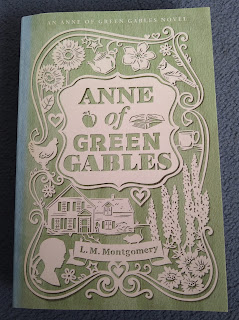A TALE MOST TRAGICAL by Joy Margetts
Soon, however, I was dismayed to find characters being
introduced that I had no memory of, themes and storylines being woven in that
were definitely not consistent with the period and tone of the original book.
For example, Gilbert Blythe has a year out (age 16!) to travel the world employed
as a stoker on a steam boat, where he meets, befriends and brings home an ex -slave
from Trinidad, who later becomes a central character. Anne's friend, Cole, is artistically
gifted, and disappears off into the woods to make scultures, to escape the school
bullies. He struggles with his sexuality and we see him even considering suicide.
Then we are introduced to the native Indian family and the role of the now vilified Canadian
school system in abusing their child.
Whilst all these were interesting storylines and made for
good dramatic watching, they were so inconsistent with the feel, values and
intent of the original stories that for me they just jarred. I suppose the screen
writers were looking to make the series attractive and relevant to a modern
audience, and may well have been successful in this (apparently 13 million complaints
were made when Netflix announced the final series)*. But for me, this rehashing
of Anne of Green Gables, was in Anne’s own words, ‘tragical’.
 |
| Silver Bush, her childhood home |
Cavendish, her home village, had a good school, and her grandparents kept an extensive library, so Maud read veraciously as a child and began to write from a very young age. She also had a spell teaching in community schools before marrying a Presbyterian Minister. She published Anne of Green Gables in 1908 and it was an immediate bestseller. She went on to write more than 20 books, only one of which was not based on her beloved Prince Edward Island. She wrote what she knew. Her life and values underpinned her writing, and her stories of simple late Victorian life in rural Canada became hugely successful. For what they were.
I wonder if Montgomery ever considered the audience she was
writing for when she wrote her books? Certainly it seems her publisher tried to
dictate, wanting more and more ‘Anne’ books, when Montgomery herself had
exhausted the character. Later in her life she also had to endure criticism from
the literary establishment that her books were naïve and overly
sentimental - her readers, however,
disagreed, as sales continued to flourish.
Screen writers I guess, have no choice but to consider their
audience, and commercial interests dictate that they write what people want to
watch. One positive thing that watching ‘Anne with an E’ did was to inspire me
to go back to the original and read the books again. I have been touched once
more by the gentle storytelling, believable characterisation, and imaginative
description of her work. She takes you right back to the time she was writing
in, and you feel every emotion. It is just delightful, and does not need any
added ‘drama’ to be utterly compelling.
L M Montgomery stayed true to herself in her writing, but what
about us? Our style, our storytelling, our values, might not appeal to
everyone, but surely our honesty to ourselves in how and what we write is
paramount? Would you drastically change your writing because a publisher asked
you too? Would you add characters and storylines inconsistent with your own
beliefs and experiences just to appeal more widely? What if you ever got to see
your work dramatized on screen? How would you feel if it were ‘adapted’ so much
as to be almost unrecognisable from the original?
I don’t know how Lucy Maud would have felt if she had sat by
me watching ‘Anne with an E’. I’m sure like Jane Austen, Emily and Charlotte
Bronte, Dickens, and indeed many of the greats whose works have been adapted
for screen with varying success, she might have squirmed. Perhaps, however,
Montgomery would have been happy to see ‘Anne with an E’ successfully introduce
her work to a whole new generation. Let’s hope it has driven some, at least, to
go and read her writing in it’s original state – and hopefully not be too
disappointed!
http://www.biographi.ca/en/bio/montgomery_lucy_maud_17E.html
https://lmmontgomery.ca/about/lmm/her-life
*https://www.theguardian.com/world/2020/apr/22/anne-with-an-e-show-cancelled-angry-fans
Joy Margetts is a newly published writer of Christian Historical Fiction. You can find out more here www.joymargetts.com



Comments
Jo Rowling and Neil Gaiman both have a relaxed attitude towards their respective fanbases when it comes to fanfic. Some fanfic is terrible. But not all of it. At best, it's a huge compliment to an author, that people want to engage with their creation at such an intense level.